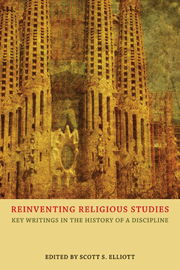Book contents
- Frontmatter
- Contents
- Introduction
- 1 For such a time as this: the Council of Societies for the Study of Religion, 1969–2009
- Part I Inventing and reinventing the field of religious studies
- 2 Why a Council on the Study of Religion?
- 3 Ironies
- 4 Religious studies: the next vocation
- 5 Impressions from Wingspread: religious studies—the state of the art
- 6 History of religions
- 7 The future of religious studies: moving beyond the mandate of the 1960s
- 8 Naming the game: a question of the field
- Part II Method and theory in religious studies
- Part III Teaching religion
- Part IV Women and the bible in religious studies
- Part V Religion and religious studies in civic life
- Part VI Religious studies and identity politics
- Part VII Islam and 9/11
- Bibliography
- Acknowledgments
- Index
5 - Impressions from Wingspread: religious studies—the state of the art
from Part I - Inventing and reinventing the field of religious studies
- Frontmatter
- Contents
- Introduction
- 1 For such a time as this: the Council of Societies for the Study of Religion, 1969–2009
- Part I Inventing and reinventing the field of religious studies
- 2 Why a Council on the Study of Religion?
- 3 Ironies
- 4 Religious studies: the next vocation
- 5 Impressions from Wingspread: religious studies—the state of the art
- 6 History of religions
- 7 The future of religious studies: moving beyond the mandate of the 1960s
- 8 Naming the game: a question of the field
- Part II Method and theory in religious studies
- Part III Teaching religion
- Part IV Women and the bible in religious studies
- Part V Religion and religious studies in civic life
- Part VI Religious studies and identity politics
- Part VII Islam and 9/11
- Bibliography
- Acknowledgments
- Index
Summary
It was a time of informal inventory taking. This in itself says something not only about the tenor of the meeting, but also about the larger expectations and awarenesses that were focused there.
Religious studies is no longer in its gestation period. This is not its time of beginnings, nor an era in which developmental strategy can find support from expansionist aspirations. The days of infancy are past. And, even if they were not, the academic climate is very different now from what it was a decade ago, or even five years ago. The days when “better” meant “more” and vitality translated into “full out” have passed from the educational scene.
So, it was inventory time. And the intention of the conference was to identify needs and expectations in light of these changed conditions. The format was designed to help make “the evolution of the discipline” (to use Stephen Toulmin's phrase) a bit more self-conscious. There was some hope that ways might be found to engage the future responsibly, less as reaction to exigency and circumstance and more through reasoned pacing, deliberate cooperation, and strategic integration.
The work of the conference was prefaced by an address by Harold Cannon, Director of the Research Division of the National Endowment for the Humanities. Dr Cannon sketched some trends within the humanities, and described the disposition of the Endowment in its grant-making capacities. William Clebsch provided an intriguing context-setter, focusing on the Renaissance origins of the humanities with particular reference to its attitude toward the study of religion.
- Type
- Chapter
- Information
- Reinventing Religious StudiesKey Writings in the History of a Discipline, pp. 43 - 45Publisher: Acumen PublishingPrint publication year: 2013



